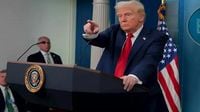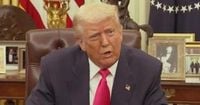The administration of U.S. President Donald Trump is preparing to issue an executive order aimed at easing restrictions on military equipment exports, according to reports from Reuters. The announcement is expected to be made between Wednesday, April 2, 2025, and Thursday, April 3, 2025, based on information from four sources familiar with the discussions.
These sources, which include individuals from both government and industry, anticipate that the forthcoming directive will closely resemble legislation proposed last year by Michael Waltz, who served as a national security advisor to Trump while he was a Republican member of Congress. This proposed legislation aimed to modify the existing Arms Export Control Act, which governs the export of military equipment and services.
If enacted, Waltz's draft law would have significantly raised the minimum dollar amounts that trigger Congressional review for arms sales to foreign nations. Specifically, the thresholds for arms transfers would increase from $14 million to $23 million, while the threshold for sales of military equipment, technology, training, and other services would rise from $50 million to $83 million.
During his first term, President Trump has voiced his frustration with members of Congress who have delayed foreign arms sales due to concerns over human rights issues. This ongoing tension between the executive and legislative branches reflects a broader debate about the implications of U.S. arms exports on global human rights and security.
The move to ease export restrictions aligns with Trump's long-standing focus on bolstering the U.S. defense industry and enhancing military partnerships with allied nations. By relaxing these regulations, the administration hopes to facilitate increased sales of American military products, which could significantly benefit U.S. manufacturers and create jobs in the defense sector.
However, critics of such regulatory changes argue that loosening restrictions could lead to greater risks of military equipment falling into the wrong hands, potentially exacerbating conflicts and undermining U.S. foreign policy objectives. Concerns have been raised about the ethical implications of supplying arms to countries with poor human rights records or those involved in controversial military actions.
As the Trump administration prepares to unveil this executive order, it remains to be seen how Congress will respond. Lawmakers from both parties have historically expressed reservations about arms sales, particularly when they involve nations with questionable human rights records. This dynamic could lead to further debates and discussions in the coming weeks as the administration seeks to implement its new policy.
In summary, President Trump's anticipated executive order represents a significant shift in U.S. arms export policy, aiming to streamline the process and enhance the competitiveness of American defense contractors on the global stage. The implications of this change will likely resonate across international borders, influencing U.S. relations with key allies and adversaries alike.





